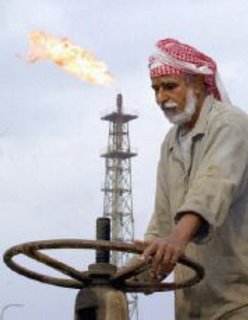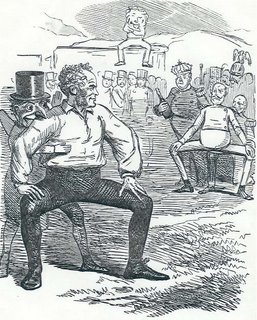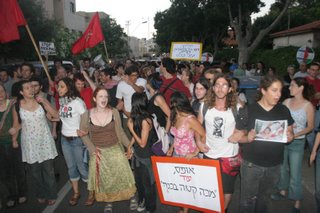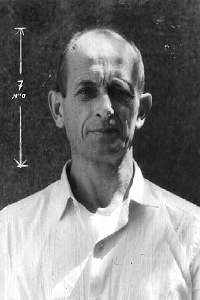Naftana answers TUC's man
 HASSAN JUMA'A AWAD of the Iraqi General Union of Oil Employees, in Los Angeles during a tour last year hosted by US Labor Against the War.
HASSAN JUMA'A AWAD of the Iraqi General Union of Oil Employees, in Los Angeles during a tour last year hosted by US Labor Against the War.Iraqi union leaders spoke at meetings and had talks with American union leaders including John Sweeney, president of the AFL-CIO unions.
(photo from People's Weekly World, June 25, 2005)
http://www.pww.org/article/articleview/7267/1/275/
THE Iraqi government has frozen the bank account of the General Union of Oil Employees, an independent trade union that has sought to unite oilworkers across Iraq and resist moves to let foreign big business gain control of Iraq's oil wealth.
In response to a call for help to the oilworkers' union, Owen Tudor, head of the TUC's European Union and International Relations Department, said "The TUC is unaware of what has happened to the Oil Workers Union (it doesn't help that they seem only to communicate with small campaigning organisations rather than the global oil workers federation (ICEM) or the global trade union movement (ICFTU)".
Concerning the Iraq government's use of Decree 8750 to intervene in the lawyers union and others, Tudor regretted it, but accused Naftana(Our Oil), the London-based support group for the oilworkers' union of "a massive exaggeration" in describing this as "the September 2005 decree making all trade union activity illegal".
"This is not intended to stop people protesting about Decree 8750, as theTUC, ICFTU and Iraqi unions have been for nearly a year. But hyperbole doesn't help, it sends people off in the wrong direction", the TUC's international officer said.
We have commented on this, and quoted comments by Iraqi academic Sami Ramadani. Now NAFTANA has issued this response to the comments issued by Owen Tudor, which would seem to put paid to the claim that the Iraqi oil union only communicates with "small campaigning organisations". It also makes clear that GUOE and its supporters have taken a principled stand - something which the TUC, if it is to defeat anti-union laws in Britain, as well as Iraq, could learn from.
.Naftana, June 29th 2006Almost two years ago in July 2004, the General Union of Oil Employees issued a letter, detailing the formation of the federation and asking for affiliation to ICEM. This was translated into English and sent to Jim Catterson, Director of Organisatiom, at ICEM. This was the firstmajor move from the union towards international recognition, support andprotection. Since then, Hassan Jumaa,
President of the GUOE has met with Jim Catterson in London to further discuss affiliation.The union has invited ICEM to send a delegation to Basra twice, both on a private fact-finding visit and for the union’s first anti- privatisation conference in May 2005. The GUOE communicates with ICEM, on a regular if infrequent basis. The Union was invited to and sent a delegate to ICEM’senergy industries seminar in Jordan in last April 2006.It is therefore untrue to say that the union has not pursued links withinternational union federations.
The GUOE has tried to forge links with the TUC’s Iraq Solidarity Committee too. The GUOE was represented at the TUC’s Iraqi
Union’s conference in February 2005 by Hassan Jumaa, the union’s president. Upon Hassan’s second visit in December, when Owen Tudor was asked if the solidarity committee could in any way help with Hassan’s accommodation costs, we were told that no assistance could be offered. When we askedif Hassan could attend an Iraq Solidarity Committee meeting last December 2005, we were told,
bluntly and with no explanation or fraternal apology, that it would not be possible for Hassan to attend.No support has ever been offered to the GUOE from the committee.The above represent attempts by the GUOE to cultivate links with the TUC in the UK, which have been rebuffed.
The GUOE was not created through any political party apparatus – unlike other trade unions in Iraq. It had no international representatives or members in exile. It had no support structure outside of Iraq whatsoeverwhen it was first established. It is a grassroots trade union and the solidarity and support links – both in the UK and internationally -which have been cultivated so far, have been generated and organised, equally, at a grassroots level without the help of political parties orgovernmental organisations.
The GUOE does not take dues from its members as they are too poor to afford them. They have not been able to form an accountancy
and payment processing structure due to being unable to open an account in Iraq.The union has refused funding from the British Council and receives no funding from any other government or occupation related sources. It has no sponsoring political party to give it any funding either. The unionis in an incredibly vulnerable financial position. The Jordan account was created to process solidarity donations from NGOs, trade unions andanti-war organisations.
For Owen Tudor to not take seriously the predicament that the union is facing displays either ignorance of the situation independent unions arefacing on the ground in Iraq or a wilful disregard for the GUOE’s predicament. Again on the issue of the GUOE ‘only communicating with small campaigning organisations’, the union has in fact, solidarity links with the over 3 million member strong US Labor Against War based in the US, the FIOM – Italy’s national trade union federation, plus trade unions,civil society and anti war groups in Germany, the Philippines, Australia, Canada, Poland, France and Denmark. In the UK, it has the support of the TGWU,
the NUJ, NATFHE and the GMB.This again points to the false impression Owen has given of the natureof the relationships the GUOE has.Naftana – the UK based support committee for the GUOE has been approved and empowered by the union to act as a channel of information andcommunication with trade unions and civil society organisations worldwide and also to work with the union to help it achieve one of its key aims: combating the privatisation of Iraq’s oil through Production Sharing Agreements in order to keep Iraq’s oil as a public asset to be used for the maximum benefit for All Iraqis from the North to the South.
We regularly issue statements from the union in order to promote itswork and try to keep it safe from attack. Keeping up the flow of information; creating meaningful links with civil society groups, unionsand NGOs; raising funds for the union; facilitating international visits; and crucially, offering advice and up to the
minute information on the plans for oil privatisation to the union have been Naftana’s main tasks.Naftana is independent of all political parties both within theUK and Iraq and is made up of volunteers, all organising in their spare and
limited time. Naftana would love for the union to have its own fully functioning international relations department so that there would be no need for us to exist and it is our mission to develop this and turn it into a reality.To sum up, Owen’s statement is factually incorrect and appears to betray personal political disagreements – which Owen is of course free to have- with the GUOE and its support mechanism here in the UK. Some clarity and honesty as to whether his position is representative of the TUC’s International Department and the TUC Iraq Solidarity Committee would be appreciated
Over to you, brother.
Labels: Hassan Juma'a, Iraq, oil, trade unions












